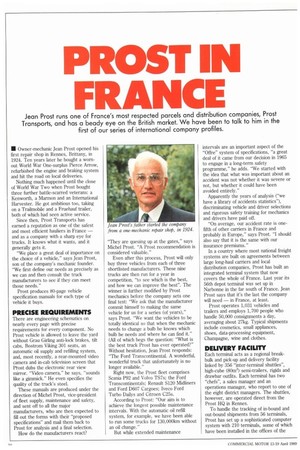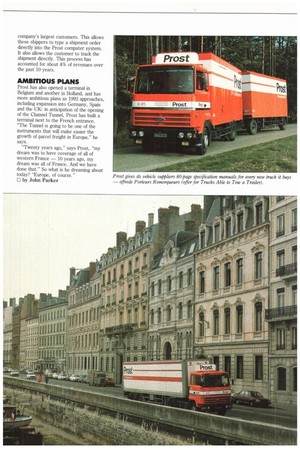PROST IN
Page 52

Page 53

If you've noticed an error in this article please click here to report it so we can fix it.
FRANC
Jean Prost runs one of France's most respected parcels and distribution companies, Prost Transports, and has a beady eye on the British market. We have been to talk to him in the first of our series of international company profiles.
• Owner-mechanic Jean Prost opened his first repair shop in Rennes, Brittany, in 1924. Ten years later he bought a wornout World War One-surplus Pierce Arrow, refurbished the engine and braking system and hit the road on local deliveries.
Nothing much happened until the close of World War Two when Prost bought three further battle-scarred veterans: a Kenworth, a Marmon and an International Harvester. He got ambitious too, taking on a Traihnobile and a Fruehauf trailer, both of which had seen active service.
Since then, Prost Transports has earned a reputation as one of the safest and most efficient hauliers in France — and as a company with a sharp eye for trucks. It knows what it wants, and it generally gets it.
"We place a great deal of importance on the choice of a vehicle," says Jean Prost, son of the company's mechanic founder. "We first define our needs as precisely as we can and then consult the truck manufacturers to see if they can meet those needs."
Prost produces 80-page vehicle specification manuals for each type of vehicle it buys.
PRECISE REQUIREMENTS
There are engineering schematics on nearly every page with precise requirements for every component. No Prost vehicle is allowed to leave the yard without Grau Girling anti-lock brakes, tilt cabs, Bostrom Viking 301 seats, an automatic oil supply and refilling system, and, most recently, a rear-mounted video camera and in-cab television screen that Prost dubs the electronic rear view mirror. "Video camera," he says, "sounds like a gimmick." He even specifies the quality of the truck's steel.
These manuals are produced under the direction of Michel Prost, vice-president of fleet supply, maintenance and safety, and sent off to all the major manufacturers, who are then expected to fill out the forms with their "proposed specifications" and mail them back to Prost for analysis and a final selection.
How do the manufacturers react? "They are queuing up at the gates," says Michel Prost. "A Prost recommendation is considered valuable."
Even after this process, Prost will only buy three vehicles from each of three shortlisted manufacturers. These nine trucks are then run for a year in competition, "to see which is the best, and how we can improve the best". The winner is further modified by Prost mechanics before the company sets one final test: "We ask that the manufacturer commit himself to making the same vehicle for us for a series (of years)," says Prost. "We want the vehicles to be totally identical so that when the mechanic needs to change a bulb he knows which bulb he needs and where he can find it." (All of which begs the question; "What is the best truck Prost has ever operated?" Without hesitation, Jean Prost responds; "The Ford Transcontinental. A wonderful, wonderful truck that unfortunately is no longer available."
Right now, the Prost fleet comprises Scania P92 and Volvo TS7s; the Ford Transcontinentals; Renault S120 Midliners and Ford D607 Cargoes; Nem Ford Turbo Dailys and Citroen C25s.
According to Prost: "Our aim is to achieve the longest possible maintenance intervals. With the automatic oil refill system, for example, we have been able to run some trucks for 130,000km without an oil change."
But while extended maintenance intervals are an important aspect of the "Offre" system of specifications, "a great deal of it came from our decision in 1965 to engage in a long-term safety programme," he adds. "We started with the idea that what was important about an accident was not whether it was severe or not, but whether it could have been avoided entirely."
Apparently the years of analysis ("we have a library of accidents statistics"), discriminating vehicle and driver selections and rigorous safety training for mechanics and drivers have paid off.
"On average, our accident rate is onefifth of other carriers in France and probably in Europe," says Prost. "I should also say that it is the same with our insurance premiums."
In a country where most national freight systems are built on agreements between large long-haul carriers and local distribution companies, Prost has built an integrated terminal system that now covers the whole of France. Last year its 56th depot terminal was set up in Narbonne in the far south of France. Jean Prost says that it's the last the company will need — in France, at least.
Prost operates 1,031 vehicles and trailers and employs 1,700 people who handle 50,000 consignments a day, averaging about 27kg. Typical shipments include cosmetics, small appliances, shoes, data-processing equipment, Champagne, wine and clothes.
DELIVERY FACILITY
Each terminal acts as a regional breakbulk and pick-up and delivery facility linked by 356 "inter-terminal shuttles", high-cube (80e) semi-trailers, rigids and drawbar outfits. Each terminal has two "chefs", a sales manager and an operations manager, who report to one of the eight district managers. The shuttles, however, are operated direct from the Prost HQ in Rennes.
To handle the tracking of in-bound and out-bound shipments from 56 terminals, Prost has set up a sophisticated computer system with 210 terminals, some of which have been installed in the offices of the company's largest customers. This allows these shippers to type a shipment order directly into the Prost computer system. It also allows the customer to track the shipment directly. This process has accounted for about 4% of revenues over the past 10 years.
AMBITIOUS PLANS
Prost has also opened a terminal in Belgium and another in Holland, and has more ambitious plans as 1992 approaches, including expansion into Germany, Spain and the UK: in anticipation of the opening of the Channel Tunnel, Prost has built a terminal next to the French entrance. "The Tunnel is going to be one of the instruments that will make easier the growth of parcel freight in Europe," he says.
"Twenty years ago," says Prost, "my dream was to have coverage of all of western France — 10 years ago, my dream was all of France. And we have done that." So what is he dreaming about today? "Europe, of course."
El by John Parker
















































































































































